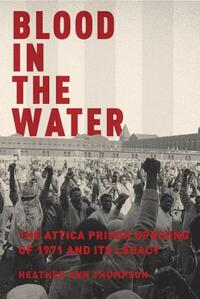You need to sign in or sign up before continuing.
Take a photo of a barcode or cover
247 reviews for:
Blood in the Water: The Attica Prison Uprising of 1971 and Its Legacy
Heather Ann Thompson
247 reviews for:
Blood in the Water: The Attica Prison Uprising of 1971 and Its Legacy
Heather Ann Thompson
Easily a five star book. I obviously have heard of Attica, but did not know the story. I am so glad that I read this book and even more glad that it was written. In the Epilogue, the author stated it took her 10 years to write this book. I can't believe the effort it must have taken to put this together. If you have a pulse you should read this book, I guarantee it will be worth your time.
This was an extremely powerful and upsetting book about Attica, and also the state of prisons and government's obstructionism when it comes to helping people it has wronged. I highly recommend this book for anyone who thinks the government cares about them.
Thinking of only reading happy stuff for a while. My heart and my head hurts ...
A gory moving account of the 1971 Attica Prison Uprising. Note: chap 1-5 are not for the faint of heart. This is very graphic and detailed. For all that, it is necessary in a police and carcarel system that tries to sanitize its violence.
informative
medium-paced
Focused too much on the day to day of the legal cases and not enough on the ways Attica impacted the broader prisoners’ rights or civil rights movement. Those issues confined to a 20 page epilogue in a 1000 page book? Weird!
This book was an interesting read, but also very exasperating. It showed me how difficult it can be to get any kind of justice when you're not in a position of power. The process of law was so slow and easy to bog down that the second half of the book, with all the legal battles, was just a constant exercise in frustration. It's especially absurd that so many of the people involved died while waiting for the legal process to complete. Very Kafkaesque. The account of the uprising itself was also saturated with that feeling of powerlessness. The prisoners essentially had no ability to protect themselves from abuse either before, during, or after the events. Some of the people in this book, like Nelson Rockefeller, just felt very distant and untouchable. It makes me wonder whether the powerless in a society can ever actually be protected, or if the well-connected and powerful will always be able to selectively enforce or ignore the law.
dark
emotional
informative
reflective
sad
tense
This book, the 2017 Pulitzer Prize winner in nonfiction, was impossible to put down. I didn’t know much about Attica going in, but I learned almost more than I could bear. To say I was sickened would be an understatement. (Apologies to the multnomah county library for any damages that came from me literally punching this book while screaming FUCK YOU alone in my apartment.) On September 9, after years of protesting deteriorating conditions at Attica prison in upstate NY, a riot erupted and inmates seized control of a huge portion of the prison, taking nearly forty hostages, most of them corrections officers and some of them civilian employees of the prison. After five tense days of negotiation, the State—under orders from Governor Rockefeller, consulted on with President Nixon—stormed the yard with hundreds of poorly prepared troopers armed to the teeth with insane amounts of live ammunition including hundreds of shotguns with buckshot that sprayed pellets everywhere. Over thirty prisoners and ten hostages were killed by the State, and hundreds more brutally wounded. In the aftermath, prisoners were mercilessly tortured and beaten. One cannot separate the events of Attica from the climate of the times—most prisoners there were Black and Puerto Rican, and quashing the uprising was seen by the FBI, the President, everyone, as vital to stomping out a symptom of black liberation, their biggest fear. Thompson’s book took 10 years to write. She dug up dirt long buried by the State. I was shocked when the storming of the prison ended on page 200—out of 600. I was no less riveted by the remaining 400 pages, as the prisoners and hostages and their families all struggled for decades to find justice. As Thompson writes, Attica didn’t cause the racist system of mass incarceration, but it’s a vital piece of the puzzle that needs to be understood. For as angry as this book made me I was also often touched by the brotherhood and solidarity exhibited the victims of the State’s violence, obfuscation, and denials. The carceral State is a sickness. There has to be a better way. Our desire to punish people is one of the basest aspects of our natures—we have to grapple with that.
This lady gets 5 stars for the insane amount of research that went into this book ALONE. The legal stuff is less interesting to me bc I’m a ghoul, also TIRED of corruption and cover ups, bc bruuuuuh the defense of NY State Police was shoddy and half-assed as fuuuuuuck and they still got off? GTFOH.



